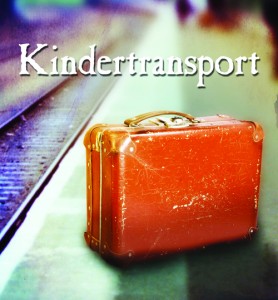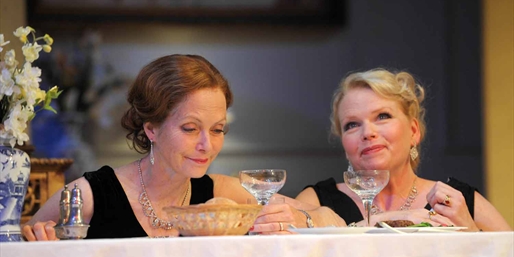“Lost Boy”–a thoughtful musical about Peter Pan after Neverland

At its best the theatre experience should offer more than “just” what takes place on the stage. I remember years ago being excited about going to see “Gypsy” on Broadway. The musical is regarded by many as being the greatest of them all and surely Broadway is its home? Well the experience was dire. The theatre was dirty, old-fashioned, grossly over-crowded (long lines for the rest rooms) and very expensive indeed. When the “Star” (I forget which American Diva it was) came on the stage the audience started cheering and stood up before Ms Rose Lee had even opened her mouth. And that continued through the rest of the evening – even when Rose tunelessly mangled “Everything’s coming up roses”!
I mention that Broadway “rip off” (for that, to me, was what it was) to contrast it with my recent evening at the wonderful “Charing Cross Theatre” in London. The theatre is one of the smallest in London with only 275 seats and as such it has a rather “Off-Broadway” feel to it. It is located underneath “The Arches” below Charing Cross Station and its nearby predecessor was once a famous Victorian music hall. When the accountants Price Waterhouse built their big office block in Villiers Street the old Music Hall had to go, but in return they created what is now the Charing Cross Theatre.
The Theatre is a lovely space built in traditional proscenium arch style with comfortable seats and good sight lines. It has the feel of a Victorian “Matcham” theatre – albeit in miniature and with modern facilities. It still has the original glass-panelled Victorian bar, from the old music hall, at the back of the stalls. The theatre also has a very nice bar and restaurant where we had an excellent supper before the show.
The show was “Lost Boy” a new musical by Phil Willmott which transferred after a successful run at the tiny Finborough Theatre in Earls Court. “Lost Boy” is an original and engaging imagination of what might have happened to “Peter Pan” after he grew up and left Neverland. And the “Lost Boys” ? Well Barrie explained what they are:
“But where do you live mostly now?"
”With the lost boys."
”Who are they?"
”They are the children who fall out of their perambulators when the nurse is looking the other way.”
Or, as the Author puts it in the programme:
“For a generation of boys their rite of passage to adulthood began with the sunny carefree adventures of …Peter Pan…and ended with them naively leading men into the slaughterhouse of the trenches.”
So 100 years after that slaughter began Willmott imagines that Peter Pan, Wendy and the rest would have been caught up in it. “Lost Boy” is not really an anti War drama as, for example, “Oh What a Lovely War” is. The death and destruction is almost taken for granted as we watch how one young officer rises swiftly to become a General – “The Boy Who Wouldn’t Grow Up” has to grow up very quickly indeed. This is not fiction – thousands of the officers who fought and died in the Great War were barely out of their teens. The normal rites of passage happened in fast forward – the night with the tarts in Paris happened only shortly after the first kiss in that concentrated wartime. Edwardian society did not prepare young men for the horrors of war. This applied whether like the fictional Pan or his real life alter-ego George Llewelyn Davies their class made them officer material or whether they were from the other side of the tracks to become the lions led by donkeys.
The music of “Lost Boy” is made by three onstage musicians (keyboard, cello and clarinet), and the songs are funny and touching. There were echoes of Sondheim in some of the songs and there can be no higher praise than that! It is a thoughtful and impressive production enhanced by the quality and the intimacy of the venue – a full house enjoyed it very much as did I.


